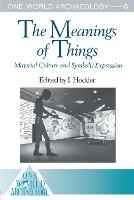


|
|
| book details |
The Meanings of Things: Material Culture and Symbolic Expression
Edited by I. Hodder

|
This book is currently unavailable. Enquire to check if we can source a used copy
|
| book description |
This unique and fascinating book concentrates on the varying roles and functions that material culture may play in almost all aspects of the social fabric of a given culture. The contributors, from Africa, Australia and Papua New Guinea, India, South America, the USA, and both Eastern and Western Europe, provide a rich variety of views and experience in a worldwide perspective. Several of the authors focus on essential points of principle and methodology that must be carefully considered before any particular approach to material culture is adopted. One of the many fundamental questions posed in the book is whether or not all material culture is equivalent to documents which can be 'read' and interpreted by the outside observer. If it is, what is the nature of the 'messages' or meanings conveyed in this way? The book also questions the extent to which acceptance, and subsequent diffusion, of a religious belief or symbol may be qualified by the status of the individuals concerned in transmitting the innovation, as well as by the stratification of the society involved. Several authors deal with 'works of art' and the most effective means of reaching an understanding of their past significance. In some chapters semiotics is seen as the most appropriate technique to apply to the decoding of the assumed rules and grammars of material culture expression.
| product details |
Normally shipped |
Publisher | Taylor & Francis Ltd
Published date | 7 Mar 2011
Language |
Format | Paperback / softback
Pages | 296
Dimensions | 234 x 156 x 0mm (L x W x H)
Weight | 453g
ISBN | 978-0-0030-2065-6
Readership Age |
BISAC | social science / anthropology / general
| other options |
|
|
|
To view the items in your trolley please sign in.
| sign in |
|
|
|
| specials |
|
|
Let's stare the future down and, instead of fearing AI, become solutionists.
|
This first comprehensive biography of Cecil Rhodes in a generation illuminates Rhodes’s vision for the expansion of imperialism in southern Africa, connecting politics and industry to internal development, and examines how this fueled a lasting, white-dominated colonial society.
|
|
|
|
|